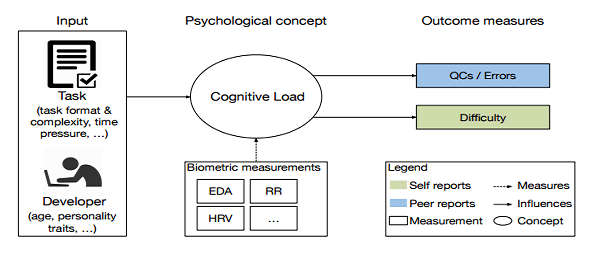| Wire Up The Programmer To Avoid Bugs |
| Written by Alex Armstrong | |||
| Thursday, 02 June 2016 | |||
|
This isn't a new idea, but it seems to have hit the headlines again. Why not monitor programmer stress levels to discover when things are getting tricky and take bug avoidance measures? You know what it is like- you are just getting to the difficult bit and some idiot comes in and asks an idiot question. In a flash you are overloaded and stressed, your heart rate goes up and you struggle to cope. Now we all know that in this situation mistakes are likely to be made. Researchers looking into this phenomenon, Sebastian C Müller and Thomas Fritz, describe their work in a paper presented at the 38th International Conference on Software Engineering. "To investigate the use of biometrics to predict code quality concerns online, we performed a field study with ten professional developers in a Canadian company over a period of two weeks. We collected a variety of metrics, including biometrics, such as heart rate variability, as well as more traditional metrics, such as code complexity and churn. After each committed change and periodically throughout the study, we asked developers to assess the perceived difficulty of the code elements—methods and classes—they were just working with."
The programmers worked in Java and used the Eclipse IDE modified to record what they were working on so as to allow the code to be related to the stress level. To get a baseline biometric reading the programmers were allowed to watch a video of fish swimming about. Every 90 minutes they were interrupted by a questionnaire that asked them to rate the difficulty of what they were working on. So did it work? "Our analysis also shows that code elements that are perceived more difficult by developers also end up having more quality concerns found in peer code reviews, which supports our initial assumption. In addition, the results show that biometrics helped to automatically detect 50% of the bugs found in code reviews and outperformed traditional metrics in predicting all quality concerns found in code reviews." The sample size was very small and there are concerns about how good the conclusions are, but it does back up previous studies. In these the researchers expressed some concern as to how programmers might react to being wired up while programming. In the current study the only concern expressed is privacy - which doesn't seem to be the issue.
More InformationUsing (bio)metrics to predict code quality online Using Psycho-Physiological Measures to Assess Task Difficulty in Software Development (pdf) Stopping Bugs Before They Sneak into Software Related ArticlesWire The Programmer To Prevent Buggy Code The Real Reason To Learn To Program - The Power Why Do We Try To Make Programming Like Something Else?
To be informed about new articles on I Programmer, sign up for our weekly newsletter, subscribe to the RSS feed and follow us on Twitter, Facebook or Linkedin.
Comments
or email your comment to: comments@i-programmer.info
|
|||
| Last Updated ( Saturday, 06 May 2017 ) |




